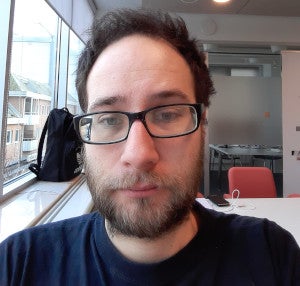GNOME
See the following -
7 Questions To Ask Any Open Source Project
Whether you're starting an open source project or deciding whether to participate in one, you don't want to waste time in an endeavor that imposes arbitrary restrictions that will stop you in your tracks down the line...
- Login to post comments
A New Android App for Teaching Kids How to Read
 Have you been looking for software to help your child to read? Well, your quest may be over. Phoenicia is a new literacy application for Android developed by Michael Hall, an open source software developer, community manager, and technology evangelist currently working at Canonical, maker of Ubuntu. In this interview, he talks about the diagnosis of his oldest child with an Autism Spectrum Disorder, his learning curve of Android development, and why user testing matters more than you think...
Have you been looking for software to help your child to read? Well, your quest may be over. Phoenicia is a new literacy application for Android developed by Michael Hall, an open source software developer, community manager, and technology evangelist currently working at Canonical, maker of Ubuntu. In this interview, he talks about the diagnosis of his oldest child with an Autism Spectrum Disorder, his learning curve of Android development, and why user testing matters more than you think...
- Login to post comments
Accessibility In Open Source For People With ADHD, Dyslexia, And Autism Spectrum Disorder
 For a long time, attention deficit hyperactivity disorder (ADHD), autism, Asperger syndrome, dyslexia, and other neurodiverse conditions were considered things that hold people back. But now, many researchers and employers recognize that neurodiversity is a competitive advantage, especially in technology, and especially when certain accommodations are provided. This is certainly true for me. I'm a 39-year-old teacher in Sweden diagnosed with ADHD and Asperger's (also referred to as Autism Level 1). I'm also an intermediate Linux user and use it daily for Java programming, productivity, and gaming. I've been using Linux since the late 1990s, and I've learned ways open source programs can be made more accessible for people with these conditions.
For a long time, attention deficit hyperactivity disorder (ADHD), autism, Asperger syndrome, dyslexia, and other neurodiverse conditions were considered things that hold people back. But now, many researchers and employers recognize that neurodiversity is a competitive advantage, especially in technology, and especially when certain accommodations are provided. This is certainly true for me. I'm a 39-year-old teacher in Sweden diagnosed with ADHD and Asperger's (also referred to as Autism Level 1). I'm also an intermediate Linux user and use it daily for Java programming, productivity, and gaming. I've been using Linux since the late 1990s, and I've learned ways open source programs can be made more accessible for people with these conditions.
- Login to post comments
Do We Still Need The FSF, GNU and GPL?
It's easy to take things for granted – to assume that the world will always be as it is. And then sometimes you receive a mild jolt: some new information appears that makes you sit up and reconsider your preconceptions. Here's one jolt I received recently: Read More »
- Login to post comments
GNOME 3.6 Released
“The GNOME Foundation is proud to present this latest GNOME release, and I would like to congratulate the GNOME community on its achievement”, said Andreas Nilsson, President of the GNOME Foundation. “I am especially happy about our advancements in accessibility and internationalization with this release. GNOME 3.6 is an important milestone in our mission to bring a free and open computing environment to everyone.” Read More »
- Login to post comments
GNOME's Sandler: Is there a killer in the code?
Imagine if your life depended on software –and the source code was proprietary? That’s the dilemma faced by recently-appointed GNOME executive director Karen Sandler. who was diagnosed with a serious heart condition in 2006 that required the implantation of a cardioverter defibrillator. Read More »
- Login to post comments
How To Get Started In Open Source
...[O]pen source communities can be unfriendly—sometimes even intimidating—to newcomers and outsiders. That might be especially true for women and people of color, who appear to be woefully underrepresented in open source...
- Login to post comments
The New Learning Center, Free eBooks, And More
Opensource.com focused on stories about open source tools and systems for libraries and other open educational content from April 14 - 18. And before you curl up with your favorite book, we've got new eBooks for you to download and some discoveries from our Open Library Week that you'll want to bookmark—or 3D print.
- Login to post comments
Top 10 Linux News Stories of 2016
 They grow up so quickly. It's hard to believe that 25 years ago Linus Torvalds announced to the comp.os.minix Usenet group that he was "doing a (free) operating system (just a hobby, won't be big and professional like gnu) for 386(486) AT clones." Since 1991, Linux has grown beyond even Torvalds' dreams. It's not a stretch to say that Linux is everywhere. Corporations large and small use Linux, and it powers computers, mobile devices, and connected hardware. Critical infrastructure relies on the stability and flexibility of Linux...
They grow up so quickly. It's hard to believe that 25 years ago Linus Torvalds announced to the comp.os.minix Usenet group that he was "doing a (free) operating system (just a hobby, won't be big and professional like gnu) for 386(486) AT clones." Since 1991, Linux has grown beyond even Torvalds' dreams. It's not a stretch to say that Linux is everywhere. Corporations large and small use Linux, and it powers computers, mobile devices, and connected hardware. Critical infrastructure relies on the stability and flexibility of Linux...
- Login to post comments
When Should Open Source Be Written Into Law?
I would suggest three areas of software which should be available upon request, without question. 1. Medical Implants. Unequivocally, any programmable electronic device which we put into our bodies should be available for review...
- Login to post comments
Who Writes Linux? Corporations, More Than Ever
Linux Foundation report shows for-profit companies provide 80-plus percent of kernel patches, with big role for mobile hardware developers Read More »
- Login to post comments
Open Invention Network Expands Open-Source Patent Protection Beyond Linux
 Today, everyone and their uncle -- yes, even Microsoft-- use Linux and open-source. A decade ago, Linux was under attack by SCO for imaginary copyright violations, and then Microsoft CEO Steve Ballmer was claiming that Linux violated more than 200 of Microsoft's patents. So Open Invention Network (OIN) patent consortium was formed to defend Linux against intellectual property (IP) attacks. The stakes may not be so high today, but Linux and open-source software is still under attack from patent trolls and other attackers...
Today, everyone and their uncle -- yes, even Microsoft-- use Linux and open-source. A decade ago, Linux was under attack by SCO for imaginary copyright violations, and then Microsoft CEO Steve Ballmer was claiming that Linux violated more than 200 of Microsoft's patents. So Open Invention Network (OIN) patent consortium was formed to defend Linux against intellectual property (IP) attacks. The stakes may not be so high today, but Linux and open-source software is still under attack from patent trolls and other attackers...
- Login to post comments